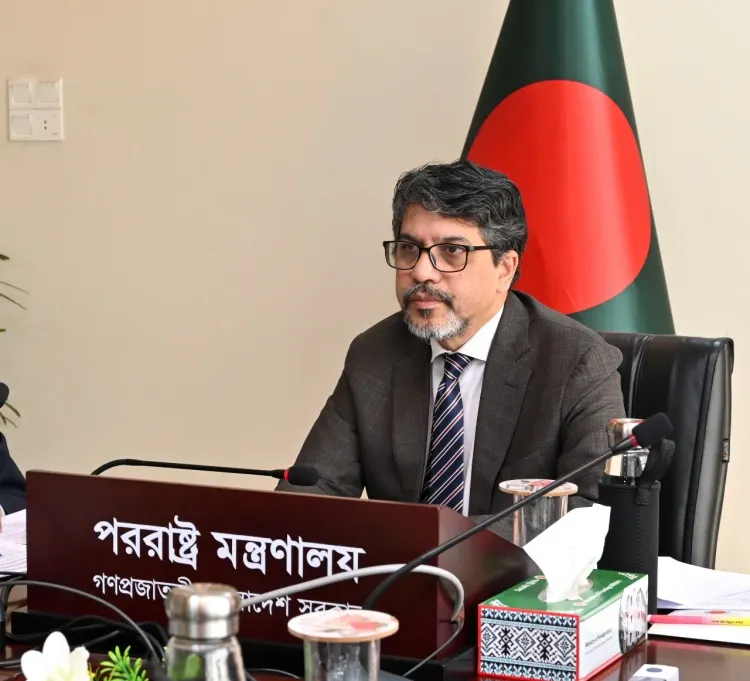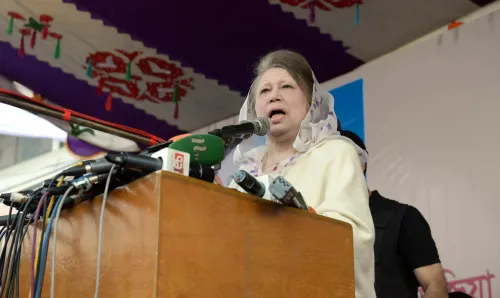Why Was Bangladesh's Foreign Secretary Jashim Uddin Removed?

Synopsis
Key Takeaways
- Ruhul Alam Siddique appointed as interim Foreign Secretary.
- Jashim Uddin's removal linked to policy disagreements.
- New diplomatic strategies may emerge under Siddique's leadership.
- Concerns over the Rohingya crisis continue to challenge Bangladesh's foreign policy.
- Analysts observe a shift towards stronger ties with Pakistan.
Dhaka, May 22 (NationPress) The Ministry of Foreign Affairs of Bangladesh has appointed Ruhul Alam Siddique to take over the responsibilities of Foreign Secretary Jashim Uddin until further notice, following Uddin's departure from his role.
Ruhul Alam Siddique, a member of the 11th batch of the Bangladesh Civil Service, previously served as the High Commissioner to Pakistan from October 2020 until December 2024.
Prior to his current assignment, Siddique worked in the Bangladesh High Commission in New Delhi and held the position of Deputy High Commissioner in Karachi.
This transition will officially take effect on Friday.
It is important to note that Jashim Uddin, a veteran foreign service officer, ceased his duties as Foreign Secretary after experiencing a lack of alignment with Chief Advisor Muhammad Yunus of the interim government and Foreign Affairs Advisor Touhid Hossain.
Uddin had been appointed as the 27th Foreign Secretary of Bangladesh in September 2024.
According to local media, Secretary (East) Nazrul Islam has assumed several crucial responsibilities under the verbal instructions of Foreign Advisor Hossain. Notably, Islam represented Bangladesh at a Foreign Secretary-level meeting with Japan in Tokyo on May 15, marking a significant departure from the norm as it was the first time in five decades that someone other than the Foreign Secretary led such discussions.
In recent weeks, Jashim Uddin was reportedly absent from key inter-ministerial meetings, with two other officials of Secretary rank taking his place.
Sources indicate that differences over foreign policy priorities, particularly concerning the Rohingya crisis and the Rakhine Corridor, contributed to Uddin's downfall.
Uddin opposed the Humanitarian Corridor initiative for Rohingya refugees advocated by Yunus and his National Security Advisor Khalilur Rahman, which was also supported by the United Nations. His stance mirrored that of the military leadership, who expressed concerns that the corridor could threaten Bangladesh's sovereignty without offering strategic advantages.
Additionally, Uddin led discussions in Dhaka with Pakistani counterpart Amna Baloch on April 17 regarding a financial claim of USD 4.32 billion from Pakistan, representing Bangladesh's fair share of assets from before 1971. The discussions also included a demand for USD 200 million in foreign aid related to the devastating Bhola cyclone.
Uddin's determination to address these issues during high-level diplomatic visits after a long hiatus caused frustration among officials from both Bangladesh and Pakistan. His isolation within the Ministry of Foreign Affairs and the Chief Advisor's Office has been noted.
Analysts suggest that the Yunus administration, backed by hardline pro-Islamist factions, is keen on strengthening ties with Pakistan while nurturing ambitions for a stricter, 'Shariat-dominated' governance in what they envision as a 'New Bangladesh.'









